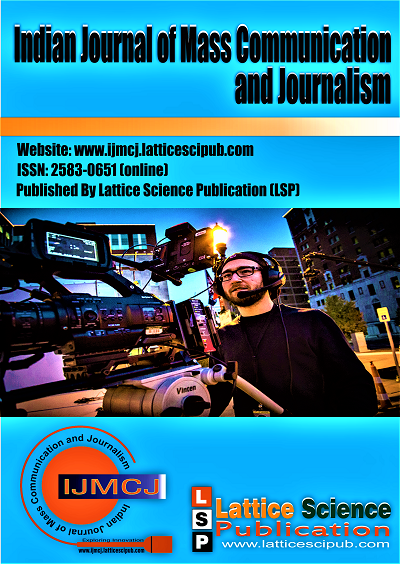Gender Stereotyping: The Role of Traditional and social media: An Analysis of Audience Perception
Main Article Content
Abstract
Gender stereotyping has been rampant since the initiation of broadcast media in the late 50s and early 60s. However, as advertisements are a more persuasive form of communication, the perception and normalization of stereotypes and the degree of persuasion become more evident and probable. Television and social media advertisements differ in their portrayal. Hence, stereotypes and the level of influence through persuasion need to be studied separately. This research compares and analyses television and social media advertisements based on stereotypes. In addition, the audience’s perception and the level of persuasion are analyzed. Forthis purpose, the researcher has used content analysis and survey through questionnaire methods to identify the different socio-cultural factors that strengthened the process of stereotyping through media and to find out a probable solution to minimize, if not eliminate, this problem.
Downloads
Article Details

This work is licensed under a Creative Commons Attribution-NonCommercial-NoDerivatives 4.0 International License.
How to Cite
References
Åkestam, Nina & Rosengren, Sara & Dahlen, Michael & Liljedahl, Karina & Berg, Hanna. (2021, March 29).Gender stereotypes in advertising have negative cross-gender effects. https://doi.org/10.1108/EJM-02-2019-0125
BBDO Guerrero. (December 2013).Pantene: Labels against Women BBDO India. (January2019).Ariel: Share the load.
Charles R Tayor, Alexander Mafael,Sascha Raithel,David W Stewart.(August2019).Portrayals of Minorities and Women in Super Bowl Advertising. https://doi.org/10.1111/joca.12276
Fahad Pathan. (July, 2019).Kinder Joy.
Jodi L. Bremer.(1994).Advertising preferences when presented with various ad stimuli: the impact of stereotypical versus non-stereotypical advertising.
Katherine Puddifoot.(.September 2021).Defining Stereotypes and Stereotyping Leo Burnett.(September,2016).Whisper #LikeAGirl. https://doi.org/10.1093/oso/9780192845559.003.0002
Mullen Lintas.(August,2017).TATA Tea Jaago Re – Inequality gets Learnt. Equality needs Teaching.
Nina Akestam. (February 13, 2017).Think about it – can portrayals of homosexuality in advertising prime consumer-perceived social connectedness and empathy? https://doi.org/10.1108/EJM-11-2015-0765
Ogilvy & Mather.(March,2016).Titan Raga – #BreakTheBias.
Pryor, Debra, Knupfer, Nancy Nelson. (1997, January 1). Gender Stereotypes and Selling Techniques in Television Advertising: Effects on Society.
Racist Commercial FT. Fair & lovely. (2017, June 3) Sayantan Choudhury.(April,2021).Bhīma : Pure as Love.
Shourini Banerjee, Onkargouda Kakade.(March 30, 2016).Stereotyped Gender Ads in Hindi TV Channels: An Analysis.
Tony Yan, Michael R Hyman.(December 2021).How can we minimize visual stereotypes in ads?
Vaishali Shrikhande.(2003).Stereotyping of Women in Television Advertisement Zotos, Yorgos,Eirini, Tsichla.(2021, March 29).Female Stereotypes in Print Advertising: A Retrospect.
Gender stereotypes in advertising have negative cross-gender effects. (March 29, 2021)
Gender Stereotypes and Selling Techniques in Television Advertising: Effects on Society. (January 1, 1997)
Female Stereotypes in Print Advertising: A Retrospective Analysis. (August 25, 2014)
Stereotyping of Women in Television Advertisement. Louisiana State University LSU Digital Commons. (2003)
Think about it – can portrayals of homosexuality in advertising prime consumer-perceived social connectedness and empathy? (February 13, 2017)
Advertising preferences when presented with various ad stimuli: the impact of
Stereotypical versus non-stereotypical advertising. Modern Psychological Studies. (1994)
How can we minimize visual stereotypes in ads? Journal of Current Issues and Research in Advertising. (December 2021)
Stereotyped Gender Ads in Hindi TV Channels: An Analysis. (March 30, 2016)
Defining Stereotypes and Stereotyping: How Stereotypes Deceive Us. (September 2021)
Portrayals of Minorities and Women in Super Bowl Advertising. Journal of Consumer Affairs. (August 2019)
Kashekova, I. E., & Kononova, E. A. (2019). Cognitive Factors of “Art+” Cross-Cultural Pedagogical Technology. In International Journal of Innovative Technology and Exploring Engineering (Vol. 9, Issue 1, pp. 1305–1311). Blue Eyes Intelligence Engineering and Sciences Engineering and Sciences Publication - BEIESP. https://doi.org/10.35940/ijitee.l3624.119119
Muthuraman, Dr. S., Al Haziazi, Dr. M., Uthaman, N., & Alghazali, S. H. S. (2023). Consumer Perception & Awareness on Food Safety in the Developing Countries – A Critical Review. In International Journal of Management and Humanities (Vol. 9, Issue 5, pp. 8–11). Blue Eyes Intelligence Engineering and Sciences Engineering and Sciences Publication - BEIESP. https://doi.org/10.35940/ijmh.e1552.019523
Subba, Dr. R. (2020). Consumer’s Predilection towards Online Shopping in selected areas of Bongaigaon Town of Assam. In International Journal of Recent Technology and Engineering (IJRTE) (Vol. 8, Issue 6, pp. 5111–5115). Blue Eyes Intelligence Engineering and Sciences Engineering and Sciences Publication - BEIESP. https://doi.org/10.35940/ijrte.f1115.038620
Nisrutha. (2019). An Empirical Analysis Of Gender Role Stereotype Both At Work Place And Home. In International Journal of Engineering and Advanced Technology (Vol. 9, Issue 2, pp. 343–349). Blue Eyes Intelligence Engineering and Sciences Engineering and Sciences Publication - BEIESP. https://doi.org/10.35940/ijeat.b3139.129219
V, H. A. K. K. (2022). Disabled or Differently-Abled: A Reading on Disability in A Song of ICE and Fire. In Indian Journal of Social Science and Literature (Vol. 2, Issue 1, pp. 37–41). Lattice Science Publication (LSP). https://doi.org/10.54105/ijssl.a1031.092122





